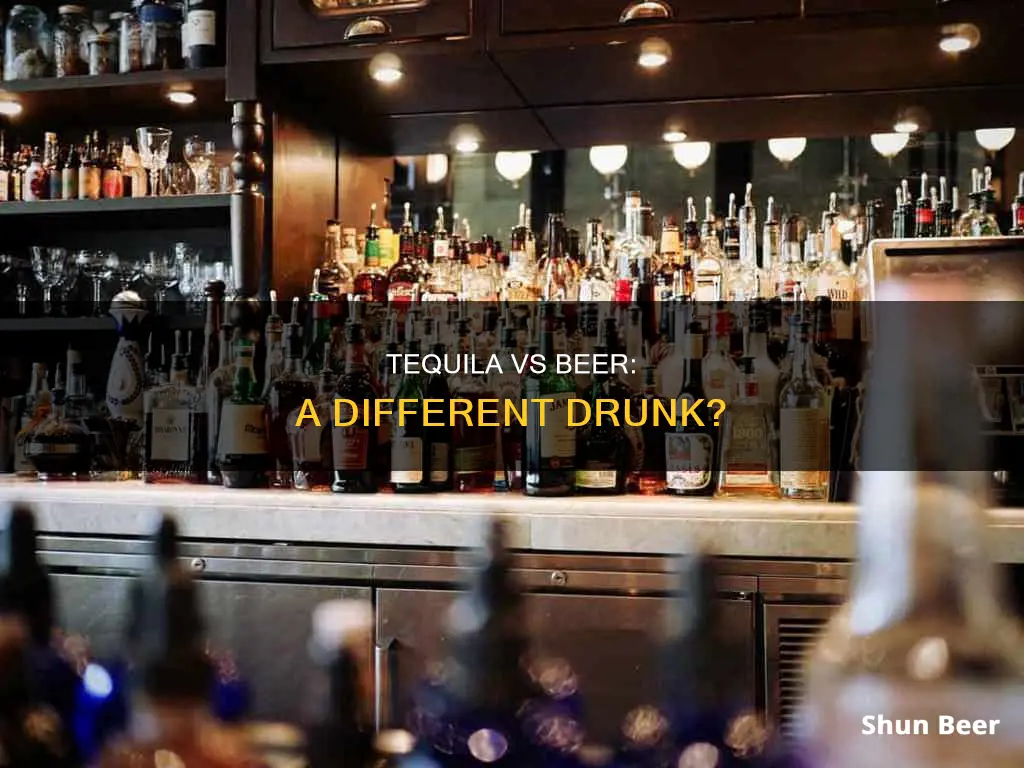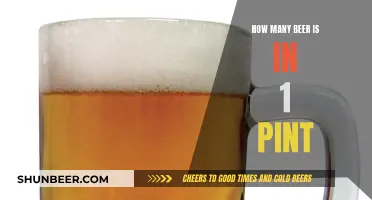
There is a common misconception that the type of alcohol we consume affects our behaviour. Many people believe that drinking tequila makes them crazy, while wine makes them emotional. However, science suggests that these differences in behaviour are not caused by the type of alcohol but by other factors. Firstly, the method and pace of drinking matter – taking three shots in an hour will result in a higher level of intoxication compared to slowly sipping a glass of whiskey. Secondly, the social context and our expectations play a role. If we do tequila shots, we are probably geared up for a wild night, whereas slowly savouring a glass of wine usually indicates a more relaxed evening. Lastly, the mixers we use can also influence our experience, as they can provide a buzz or speed up the absorption of alcohol. Ultimately, all alcoholic beverages contain the same intoxicating ingredient – ethanol – which affects our brain in the same way, regardless of whether we drink it in a shot or sip it from a glass.
| Characteristics | Values |
|---|---|
| Alcohol Content | Beer has a lower alcohol content than tequila. |
| Method of Consumption | Beer is sipped over time, while tequila is often consumed in shots. |
| Social Context | Beer is associated with a mellow night, while tequila is associated with a wild night. |
| Congeners | Beer and tequila have different congeners, which may affect mood and behaviour. |
| Mixers | Beer contains carbonation and other ingredients that may alter its effects compared to tequila. |
What You'll Learn

Tequila is a depressant, not a stimulant
There is a common misconception that tequila is a stimulant. However, this is a myth. Tequila is a depressant, like all other liquors.
Tequila is a distilled liquor made from the fermented juices of the Weber blue agave plant. It is typically consumed in shots, which may be why many people associate it with a stimulating effect. When consumed in small amounts, alcohol can have a euphoric effect, and tequila is often associated with heavy binge drinking and rowdy behaviour. However, the stimulating effects of alcohol are temporary, and as consumption continues, the depressant effects become more pronounced.
The stimulating effects of alcohol are due to the release of dopamine in the brain, which provides energy, stimulation, and good feelings. Alcohol also increases heart rate and blood pressure and heightens alertness, confidence, and energy levels. These effects are more noticeable when blood alcohol concentration (BAC) is lower, around 0.05 milligrams per litre. As BAC increases, the depressant effects of alcohol start to take over.
Alcohol is a central nervous system depressant, slowing brain function and neural activity and impairing the ability to think clearly. It affects the neurotransmitter GABA (gamma-aminobutyric acid), which slows brain activity, resulting in slurred speech, relaxation, coordination problems, and drowsiness. As alcohol consumption continues, the depressant effects become more prominent, leading to sedation, impaired judgment, slowed reaction times, and decreased motor coordination.
While tequila may make people feel more energised and excited, it is important to remember that it is a depressant, not a stimulant. The stimulating effects of tequila are temporary, and as consumption continues, the depressant effects will become more noticeable.
Beers Around the Globe: Exploring the Varieties
You may want to see also

The alcohol molecule is the same in all alcoholic drinks
Ethanol is produced through the fermentation of grains, fruits, or vegetables, where yeast or bacteria react with the sugars in the other ingredients to create ethanol and carbon dioxide. The alcohol content of a drink depends on how long it is left to ferment. Distillation is another process that alcoholic drinks may undergo, where some water is removed, resulting in a higher concentration of alcohol in the final product.
Despite the common belief that different types of alcohol induce distinct emotional responses, scientific research suggests otherwise. Studies have failed to find any significant differences in how various liquors affect mood. The method and pace of consumption, however, can greatly influence behaviour. For instance, tequila is often consumed in shots, leading to a quicker rise in intoxication compared to sipping wine over time.
Furthermore, the presence of congeners, which are trace chemicals found in various liquors, has been examined for their potential role in altering the effects of alcohol. However, the findings are inconclusive, and more research is needed to establish a definitive link.
In summary, while different alcoholic beverages may evoke varied emotional responses, it is not due to the alcohol molecule itself, as it remains the same across all drinks. The differences lie in the unique combinations of other chemicals and compounds found in each drink, as well as the methods and rates of consumption.
Cerveza vs Beer: What's the Difference?
You may want to see also

Drinking tequila as shots increases the speed of intoxication
Tequila is a distilled liquor made from the fermented juices of the Weber blue agave plant. It is one of the most popular spirits worldwide, especially in the United States and Mexico. The alcohol content of tequila is typically between 38% and 50%, with an average of 40%. This is significantly higher than the alcohol content in beer, which is usually around 4%.
When tequila is consumed as shots, it can increase the speed of intoxication for several reasons. Firstly, the high alcohol content of tequila means that even a small amount can have a significant effect. A single shot of tequila, which is typically around 1.5 fluid ounces, contains about 40% ABV (Alcohol By Volume), which is equivalent to the amount of alcohol in an entire bottle of beer. Therefore, consuming tequila as shots can quickly lead to a high blood alcohol concentration (BAC).
Secondly, the method and pace of consumption matter. Drinking tequila as shots typically involves consuming a larger amount of alcohol in a shorter period of time compared to sipping a drink slowly. This rapid consumption can lead to a faster increase in BAC and, consequently, intoxication.
Additionally, drinking tequila on an empty stomach can also contribute to faster intoxication. Food in the stomach can slow down the absorption of alcohol by diluting it and delaying its passage into the small intestine, where it is most efficiently absorbed. Without food, the alcohol from the shots is absorbed more quickly into the bloodstream, leading to a faster rise in BAC.
It is important to note that the effects of tequila can vary from person to person, and factors such as weight, gender, metabolism, and tolerance level can influence how quickly someone becomes intoxicated. However, in general, consuming tequila as shots can indeed increase the speed of intoxication due to the high alcohol content, the rapid consumption, and the absence of food in the stomach to slow down absorption.
Heineken's Unique Brewing Process: What Sets it Apart?
You may want to see also

Mixers, not the booze, are to blame for side effects beyond drunkenness
While it is a common belief that different types of alcohol lead to different types of drunkenness, this is largely a myth. The alcohol molecule is the same in all types of alcoholic drinks, and it is a depressant that affects the brain in the same way, regardless of the drink. The idea that tequila makes people more energetic or wild is perpetuated by the fact that it is often consumed in shots, leading to faster intoxication and a higher likelihood of heavy binge drinking.
However, it is important to note that mixers play a significant role in how a person feels beyond drunkenness. For example, a rum and Coke will provide a different experience than a vodka-soda due to the sugar and caffeine content in Coke. Research suggests that carbonated beverages can also increase the rate of alcohol absorption into the bloodstream, leading to higher levels of intoxication. Additionally, the stimulating effects of caffeine in energy drinks, when mixed with alcohol, can lead to a "masking effect", where individuals feel less drunk even though their motor skills and reaction time remain impaired.
The presence of congeners, which are produced during the manufacturing process, also influences the drinking experience. Congeners are chemicals that affect the taste and smell of alcohol, and while they may play a role in how alcohol affects mood and behaviour, there is limited research to support this claim. However, congeners are known to contribute to worse hangovers.
Ultimately, the amount of alcohol consumed and the rate of consumption are the primary factors influencing drunkenness and its side effects. Mixing drinks can impact these factors, as individuals may underestimate their alcohol intake and consume at a faster rate when switching between beverages.
Mexican Beers: Unique Flavors and a Cultural Legacy
You may want to see also

Congeners may play a role in how alcohol affects mood and behaviour
Congeners are minor compounds that occur naturally in alcohol as a result of the distillation and fermentation processes. They are produced alongside ethanol, which is the main source of hangovers. While ethanol is largely responsible for the cognitive and behavioural effects of alcohol, congeners may also play a role in how alcohol affects mood and behaviour.
Congeners are thought to contribute to the taste and aroma of an alcoholic drink. For example, acetaldehyde gives bourbon and rum their fruity smell, while isobutylene alcohol has a sweet smell. The amount of congeners in a drink depends on factors such as the original sugar or carbohydrate used, and the yeast strain that ferments the sugar.
Research suggests that congeners may be responsible for causing hangovers, but they are not the only cause. Some studies have found that drinks with higher congeners, such as bourbon, result in more severe hangovers compared to drinks with lower congeners, such as vodka. This could be because the body has to break down both the congeners and ethanol, leading to longer-lasting hangover symptoms.
In addition, congeners may also affect mood and behaviour while intoxicated. For example, congeners may stimulate the body to release stress hormones, which can lead to inflammatory responses and fatigue. However, more research is needed to fully understand the role of congeners in alcohol's effects on mood and behaviour.
Oklahoma Beer: Unique Taste or Marketing Ploy?
You may want to see also
Frequently asked questions
All alcoholic beverages contain the same intoxicating ingredient: ethanol. Whether it's beer or tequila, the alcohol is molecularly identical and affects your brain the same way.
The way you drink alcohol can play a huge part in how you behave. For example, when someone drinks tequila, it's often in the form of shots taken in fairly short succession, whereas wine is often sipped over time.
Researchers haven't found any meaningful difference between types of liquors in terms of affecting mood. If you do behave differently when drinking a certain type of alcohol, it's most likely all in your head.







